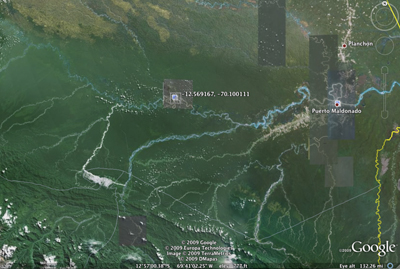Weeks after bloodshed, American oil moves into Peruvian Amazon
Commentary by Hambone Littletail Barely six weeks after dozens of Amazon natives were gunned down in cold blood by the Peruvian Army in the oil town of Bagua for protesting the cozy relationship between Big Oil and the government of President Alan Garcia, I find myself on the banks of the Mother of God River in Salvacion, Peru, wondering if all those folks died in vain. Any day now, the bulldozers will be moving in as Texas-based Hunt Oil Company – with the full go-ahead of the Peruvian government — fires its first salvo in its assault against the million-acre pristine rainforest wilderness of the little-known and largely unexplored Amarakaeri Communal Reserve. By the time you read this, the choppers will probably already be here, womp-womping their way along the very edge of Manu National Park to supply the seismic survey crews whacking their way through the jungle and blowing off explosives to see what riches lie below the surface. The local natives that the “reserve” was created to protect, like so many before them, are getting ready to have their lives irrevocably altered, and are wondering how to react to this invasion. In other words, it’s business as usual for the Planet Eaters in the Amazon jungle, as if Bagua never existed at all. I could write a book – indeed, I am writing a book – about the carnage going on down here in the heart of the Mother of God. Here is just a taste of what I’ve found so far in my first two months in Peru: If you carefully read all the reports from the massacre at Bagua, you will notice that those protesters (and other natives from all over the Peruvian Amazon, including those here in Amarakaeri) are saying that, by and large, modern-day Amazon natives are not categorically opposed to all oil and gas drilling (or logging, or mining, or ranching) on their ancestral lands – no matter how much the tree-hugging environmentalists in the U.S. with their “noble savage” fantasies don’t want to hear it. As a rule, what modern-day Amazon natives are opposed to – and rightfully so – is a bunch of foreign Planet Eaters, in cahoots with their cronies in Lima, storming into the natives’ ancestral forest homes yet again to do what they please without consulting – or, more importantly, without financially rewarding – the folks who have lived there for 50,000 years. It’s just not the right thing to do. To be blunt but honest about it, what the natives are demanding – and rightfully so, after getting pushed out of the way and screwed over by the Planet Eaters for 500 years – is their rightful piece of the economic pie. What a concept! These guys actually want to get paid – and they’re not talking about some lousy beads and fish hooks, they’re talking about some good old American greenbacks. What gall, the greedy bastards! …

Really saddened to read this. Exploitation of people and the planet is the very basis of civilization. For oil people have sold their souls 🙁